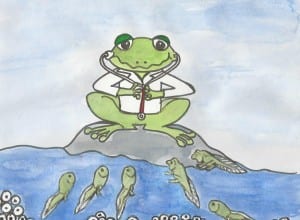
As you progress through your studies at Medical School, you’ll inevitably become acquainted with other students in older years.
As these older and wiser students pass through the doctor metamorphosis before you, you’ll have the benefit of encountering them as both fellow med student and newly-emerged doctor. We have now come to know this advanced med student species by the more common term: Familiar Foundlings.
A Familiar Foundling never frog-ets.
When you spot Familiar Foundling, it is likely that they will also recognise you – the bright-eyed, young medical student from their hazy days of study. This familiarity will often determine their reaction to your presence – if you were chummy as students, chances and encounters will continue in the same fashion.
Kermitted to the Med School cause
Discovering a Familiar Foundling during your hospital shifts can be of benefit to you in several ways:
1. Foundlings that have studied at your Medical School will better understand what is expected of you, compared to doctors that were trained elsewhere. They will remember the daily plight of needing an infinite number of skills signed off, and consequently be patient with you as you fumble through your workbook for the 6 or 7 different boxes that need signing today.
2. The recency of their metamorphosis means their exam-passing acumen has not yet atrophied. Therefore they are still a veritable font of knowledge for what information is “must-know” for exams. This is advantageous over teaching with consultants, who will tell you that every minute detail of their specialty is “must-know”. I can, however, tell you that you will not need to know the specifics of kuru, which get by eating the brains of other people with kuru. Unless you enter neurology full-time, THAT IS ALL YOU WILL EVER NEED TO KNOW.
3. Forming a bond prior to working on the ward together can help both parties feel more comfortable with one another. It eliminates first encounter introduction awkwardness and provides extra conversation topics that can be discussed when the Foundling has run out of medicine-related information to talk about. One can only discuss how cold it is outside so many times in one morning.
Don’t make them hopping mad
Of course, working alongside a Familiar Foundling does have risks, in particular in terms of getting too comfortable. Remember, Foundlings are still doctors at their place at work.
Although many won’t mind being addressed by first name, it is probably best to avoid calling them by their politically-incorrect nickname, especially amongst patients or other doctors. A patient’s perception of a doctor as a figure of responsibility and maturity is somewhat diminished when they find out that their hockey club nickname was Spewnicorn.
At the same time, one should avoid over-hassling Foundlings, for they have only just undergone their transformation. They may therefore still be feeling the pressure of life as a doctor. Being too much of a burden, particularly when they are busy, could have adverse effects on their willingness to assist. This could altogether weaken the underlying bond between you.
Toad-ally worth befriending
A friendly Foundling, if respected and not over-harried, can be a valuable asset to your Medical School training. As a medic, you should build healthy relations with senior medical students, so that when they too become future Familiar Foundlings, you can increasing the likelihood of advantageous encounters in the future.
Uploaded by Eric Richardson on 10 June, 2016
